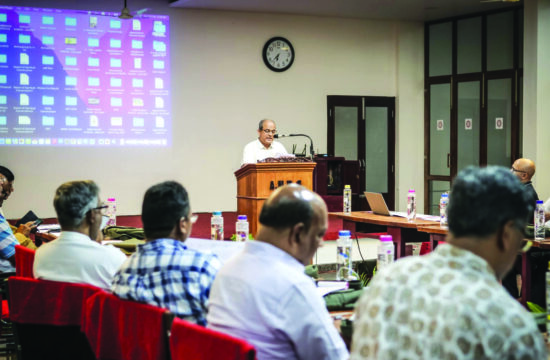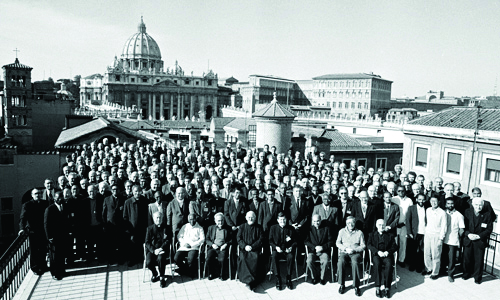For many of us, Roman Catholics, Lent is a time when we think of our personal sins. The days of fast and abstinence laid down by law enforce this mentality. Some even choose to abstain from one or the other food or drink item throughout the season as a gesture of penance. Pastors constantly tell us that Jesus died for our sins. We feel horribly guilty. Parishes organize reconciliation services, and people flock to the confessional. During the Way of the Cross and the time spent in prayer after the Maundy Thursday service, we try to be with Jesus in his passion and offer him our consolation!
This focus on personal sin is in a way rooted in the New Testament interpretation of the Good Friday tragedy. How could God allow a righteous person to die such a horrible death? The first Christians were Jews. In their struggle to make sense of the murder of Jesus they fell back on the Old Testament ideas that were basically linked with cult: scapegoat (Lev 16.7-10), paschal lamb (Ex 12.3-13), sin offering (Ex 29.36), liturgy of atonement (Lev 16.11-19), etc. They were also aware of the suffering of the Servant of Yahweh, which brings in the idea of vicarious suffering (Is 53.4-6). But unfortunately that idea was uprooted from the original prophetic context and domesticated by the cultic frame: the Servant too was a scapegoat. This process also ended up in domesticating the history of Jesus and thereby the history of salvation. The prophetical movement of Jesus became the religion of the Church.
Jesus did not just die as most of his contemporaries did. He was killed. During his ministry he antagonised the religious leaders of his time. All the four Gospels tell us that the chief priests were the main force that ensured his execution. The cleansing of the Temple was a very provocative act: Jesus was determined to purify the religion of which the Temple was the highest symbol. If we forget this dimension of the ministry of Jesus, then we end up with religion that is basically self-centred: my sin, my salvation. This kind of religion tends to be sentimental and thereby becomes a source of income, power and prestige for priests. In attacking this kind of religion, Jesus was attacking the priests who were responsible for it. No wonder, they made sure that he was eliminated.
The cleansing of the Temple is symbolic of the prophetical programme of Jesus: to proclaim the Kingdom of God and to confront all those forces that are blocking its advent. He wanted to purify religion and once again place it in the service of God’s Kingdom. Hence our Lenten observance will be very shallow if we confine ourselves to our personal sins and the need we have to reform ourselves. We need to become aware that we are surrounded by sinful structures that call for reform. We need to examine the type of religion that we espouse, evaluate it honestly, and accept reforms willingly. Here Pope Francis can help us if we are willing to learn from him. I shall confine myself only to his Evangelii Gaudium.
Pope Francis begins with the words: “The joy of the Gospel fills the hearts and lives of all who encounter Jesus… With Christ joy is constantly born anew.” But “there are Christians whose lives seem like Lent without Easter.” (6) Unfortunately sometimes even our leaders look like those who have “just come back from a funeral.” (11) Are we Catholics joyful because we have found Jesus? Or are we burdened with a sense of anxiety and guilt arising from the many rules and regulations that govern our life?
Pope Francis tells us: “In her ongoing discernment, the Church can also come to see that certain customs are not directly connected to the heart of the Gospel, even some which have deep historical roots, are no longer properly understood and appreciated. Some of these customs may be beautiful, but they no longer serve as means of communicating the Gospel. We should not be afraid to re-examine them. At the same time, the Church has rules or precepts which may have been quite effective in their time, but no longer have the same usefulness for directing and shaping people’s lives.ˮ (43) We need to evaluate not only our rules and regulations, but even our devotions and dogmas – yes even our dogmas. They may only be a burden that hinders our pilgrimage.
We ought to remember “that the task of evangelisation operates within the limits of language and of circumstances. It constantly seeks to communicate more effectively the truth of the Gospel in a specific context, without renouncing the truth, the goodness and the light which it can bring whenever perfection is not possible.” (45) Some of the dogmas we hold on to have an historical context and sometimes are even the result of some political compulsions. This is equally true of the devotions we practice.
Some of us do not want things to change. Change always creates problems. But “Pastoral ministry in a missionary key seeks to abandon the complacent attitude that says: ‘We have always done it this way’.” (33) Without an ongoing updating and reform needed to contextualize ourselves, we become irrelevant. Hence Pope Francis invites all pastors “to be bold and creative in this task of rethinking the goals, structures, style and methods of evangelization [and of Christian living] in their respective communities.” (33)
We have to note that “In our time humanity is experiencing a turning-point in its history, as we can see from the advances being made in so many fields… This epochal change has been set in motion by the enormous qualitative, quantitative, rapid and cumulative advances occurring in the sciences and in technology… We are in an age of knowledge and information.” (52) With this explosion of knowledge, there are bound to be many questions. Unfortunately there are bishops and priests who do not want questions to be raised. They shield themselves with ‘the teaching of the Church.’ They preach ‘humility and docility’. They forget that “The Church is herself a missionary disciple; she needs to grow in her interpretation of the revealed word and in her understanding of truth. It is the task of exegetes and theologians to help the judgment of the Church to mature. The other sciences also help to accomplish this; each in its own way.” (40) Unfortunately by our ordination or consecration we are insured for life. Even if we refuse to update ourselves, nobody can touch us.
The refusal to update ourselves and our structures is counterproductive. “It is undeniable that many people feel disillusioned and no longer identify with the Catholic tradition… There is also a certain exodus towards other faith communities. The causes of this breakdown include: … our difficulty in restoring a mystical adherence to the faith in a pluralistic religious landscape.” (70) This may call for an evaluation of what is actually happening now. “There is a kind of Christianity made up of devotions reflecting an individual and sentimental faith life which does not in fact correspond to authentic ‘popular piety’. (70) Authentic Christian praxis is very difficult. Pastors can insist on it only if they are seen as struggling to grow in it. Sentimental piety is a convenient escape, and it brings in rich dividends. Sentimental piety tends to keep people infantile, and some Church leaders want it that way. One of my friends remarked: “There are churches and shrines where Jesus always remains an infant, and those who frequent these places imitate him: they too remain infants all their lives, at least in matters of religion.” Some Church leaders do not know how to deal with adults. That may be one reason why they promote devotion to Infant Jesus.
Even though “the homily is the touchstone for judging a pastor’s closeness and ability to communicate to his people” (135), yet Pope Francis feels disturbed by what is actually happening. “I will dwell in particular, and even somewhat meticulously, on the homily and its preparation, since so many concerns have been expressed about this important ministry and we cannot simply ignore them.” (135) If the homilies of so many of us are not really helpful, then that is one of the consequences of our refusal to update ourselves. We have a captive audience and an indifferent community. We are secure.
Whenever religion deteriorates, the priority of values is lost. “It needs to be said that in preaching the Gospel a fitting sense of proportion has to be maintained. This would be seen in the frequency with which certain themes are brought up and in the emphasis given to them in preaching. For example, if in the course of the liturgical year a parish priest speaks about temperance ten times but only mentions charity or justice two or three times, an imbalance results, and precisely those virtues which ought to be most present in preaching and catechesis are overlooked. The same thing happens when we speak more about law than about grace, more about the Church than about Christ, more about the Pope than about God’s word.” (38) I do not remember when I last heard a good homily on social justice; when I heard a priest or bishop urging the people to pay fair wages to their workers. There are some demands of the Gospel that just do not go along with sentimental piety.
Superficial religion soon becomes lifeless. People are satisfied, but not really helped. Slowly the clergy gets into an institutional mode. Persons are important only if they help in running the institutions well. “In many places an administrative approach prevails over a pastoral approach, as does a concentration on administering the sacraments apart from other forms of evangelization.” (63) In this way we alienate people. “We must recognise that if some of our baptised people lack a sense of belonging to the Church, this is also due to certain structures and the occasionally unwelcoming atmosphere of some of our parishes and communities, or to a bureaucratic way of dealing with problems, be they simple or complex, in the lives of our people.” (63) When institutions become primary, their survival and success become primary. But Pope Francis dreams “of a ‘missionary option’, that is, a missionary impulse capable of transforming everything, so that the Church’s customs, ways of doing things, times and schedules, language and structures can be suitably channelled for the evangelisation of today’s world rather than for her self-preservation.” (27) Our Lenten practice will be authentic if we become more concerned with the other; if we abandon our narcissist complacency and become more open as pilgrims ought to be; if we are concerned more about the Kingdom of God than of our little church.
Christian life is not just a matter of convictions. It calls for an effective concern for others. “It is striking that even some who clearly have solid doctrinal and spiritual convictions frequently fall into a lifestyle which leads to an attachment to financial security, or to a desire for power or human glory at all cost, rather than giving their lives to others in mission.” (80) A commitment to others, especially the poor and the needy, will urge us to use money and power as instruments of humble service. Without this commitment to others our liturgies, prayers and devotions may lead people to “a ‘spirituality of well-being’ divorced from any community life, or to a ‘theology of prosperity’ detached from responsibility for our brothers and sisters, or to depersonalised experiences which are nothing more than a form of self-centredness.” (90)
When religion becomes a pious way of being worldly, then there are bound to be some tragic consequences. “Those who have fallen into this worldliness look on from above and afar, they reject the prophecy of their brothers and sisters, they discredit those who raise questions, they constantly point out the mistakes of others and they are obsessed by appearances. Their hearts are open only to the limited horizon of their own immanence and interests, and as a consequence they neither learn from their sins nor are they genuinely open to forgiveness. This is a tremendous corruption disguised as a good. We need to avoid it by making the Church constantly go out of herself, keeping her mission focused on Jesus Christ, and her commitment to the poor. God save us from a worldly Church with superficial spiritual and pastoral trappings! This stifling worldliness can only be healed by breathing in the pure air of the Holy Spirit who frees us from self-centredness cloaked in an outward religiosity bereft of God. Let us not allow ourselves to be robbed of the Gospel.” (97) Only by a deeper life of prayer will we be able to listen to the Spirit who leads us to the poor. Religion becomes authentic only when we move out of ourselves in quiet ways (Mt 25.32-46; Lk 10.30-37).
Lent ought to be a time not just of some pious activities, but more importantly of reflection: What is real religion? What does it mean to be a disciple of Jesus? “Each Christian and every community must discern the path that the Lord points out, but all of us are asked to obey his call to go forth from our own comfort zone in order to reach all the ‘peripheries’ in need of the light of the Gospel.” (20) As disciples of Jesus we share in his prophetical mission. One aspect of this mission was the courageous criticism of religion that had become a successful business, in the process dehumanising its adherents. Those who stand to gain by false religion will try to tie down our attention to our personal sins. But then our Lent will be very superficial; the tragedy of Good Friday will happen again and again.
The author is professor emeritus, Indian Philosophy and Religions, Jnanadeep Vidyapeeth, Pune. He is now working on those questions that crop up during inter-religious and ecumenical dialogues.













Viagra Ejakulationsstorungen canadian pharmacy cialis 20mg Baclofen Riva Cycloprine Amoxicillin Or Clindamycin Zithromax Dosage Cats
Simply want to say your article is as amazing. The clearness in your post is simply cool and i could assume you’re an expert on this subject.
Fine with your permission allow me to grab your feed to keep
updated with forthcoming post. Thanks a million and please continue the rewarding work.
Aw, this was an extremely nice post. Spending some time and actual
effort to make a great article… but what can I say… I put things off a whole lot and don’t seem to get nearly anything done.
Appreciating the persistence you put into your
website and detailed information you provide. It’s nice to come across a blog
every once in a while that isn’t the same unwanted rehashed material.
Great read! I’ve saved your site and I’m including your RSS feeds to my
Google account.
Hi! Do you know if they make any plugins to assist with Search Engine Optimization? I’m trying
to get my blog to rank for some targeted keywords but I’m not seeing very good results.
If you know of any please share. Many thanks!
great publish, very informative. I ponder why the opposite specialists of this sector don’t notice this.
You must continue your writing. I am confident, you have a
great readers’ base already!
Hello, I enjoy reading all of your article post.
I like to write a little comment to support you.
Hello to all, how is the whole thing, I think every one is
getting more from this site, and your views are good in favor of new visitors.
Amoxicillin Ointment Propecia Does Hair Growth Improve Better With 5mg. Than With1mg Cephalexin Used To Treat cialis 5mg Best Pharmacy In Canada Free Shipping Stendra Ed Secure Fedex Shipping Online Utah
Cialis Im Alter Cipro 500mg Best Prices online pharmacy Propecia 1mg
Non Prescription Cialis viagra Generico De Propecia Farmacia Online Amoxicillin And Ears Ringing
Vardenafil Generico Topically Applied Keflex buy generic cialis online Disolving Amoxicillin German Cialis
Doxycycline Without A Script online pharmacy Keflex Sinus Infections Clomid Cuisine D Action Prednisone India Pharmacy
Cialis Esperienze Levitra Aus Holland Cialis Tab order cialis online Ciprobay Bayer Viagra Billig Rezept